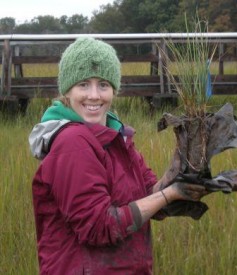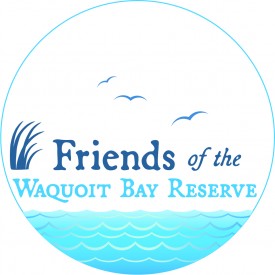Seasonal changes in Salicornia depressa metal accumulation and rhizosphere composition
Seasonal changes in Salicornia depressa metal accumulation and rhizosphere composition
Duration: June 2023—September 2023
Funding Source: Startup grant from the University of Massachusetts Boston to B. Moyers
Principal Investigators, institutional affiliation: Brook Moyers / Alice Palmer
Affiliation: University of Massachusetts Boston, Biology
Email: brook.moyers@umb.edu, alice.palmer001@umb.edu
Project Description: Salicornia species, known in New England as pickleweeds, form mutually beneficial relationships with soil microbes living on the plant’s roots (the rhizosphere), which can help improve plant growth under stressful conditions. They are also capable of accumulating metals from the soil at high concentrations. We are studying how the bacteria present in the Salicornia depressa rhizosphere differ from those in the soil surrounding the plant. We also are interested in how changes in the plants’ biology over the course of the growing season and seasonal changes in salt marsh soil chemistry affect both the rhizosphere’s composition and its ability to accumulate metal from soil. To investigate this, we are collecting samples of S. depressa, its rhizosphere, and the surrounding soil in June, before the plants begin to flower, in August, as they are flowering, and in September, as they begin to senesce. We will sequence bacteria in the rhizosphere and surrounding soil for each timepoint. We will also test the amount of metal in the soil, in S. depressa’s roots, and in S. depressa’s shoots at each timepoint to determine how much metal the plant is accumulating and where it is being stored. These results will help us understand how S. depressa copes with metal stress and its potential in removing metals from polluted marshes.
Phragmites porewater geochemistry
Project Title: Phragmites porewater geochemistry
Date: 6/2019-8/2019
Principal Investigator(s): Meagan Gonneea
Affiliations: U.S. Geological Survey: Woods Hole Coastal and Marine Science Center
Summary: Methane is an important greenhouse gas produced during methanogenesis, a metabolic pathway for decomposing organic matter in saturated soils. Conditions that favor this organic matter decomposition pathway include low salinity and high water levels, conditions that also promote the growth of phragmites. However, methane production in phragmites patches in coastal wetlands is highly variable, indicating that methane production and subsequent flux to the atmosphere are dependent on the geochemical environment. This project will compare methane cycling in phragmites patches at Sage Lot Pond to the Herring River, an impounded salt marsh in Wellfleet, MA, to better understand what environmental drivers impact methane cycling in phragmites coastal wetlands. This project is being conducted by a PEP student with USGS staff.
Spartina alterniflora Biomass Allocation and Temperature: Implications for Salt Marsh Persistence with Sea-Level Rise
Project Title: Spartina alterniflora Biomass Allocation and Temperature: Implications for Salt Marsh Persistence with Sea-Level Rise
Date: 2017
Principal Investigator(s): Crosby, S.C., Angermeyer, A., Adler, J.M., Bertness, M. D., Deegan, L.A., Sibinga, N., & Leslie, H.M.
Abstract: To predict the impacts of climate change, a better understanding is needed of the foundation species that build and maintain biogenic ecosystems. Spartina alterniflora Loisel (smooth cordgrass) is the dominant salt marsh-building plant along the US Atlantic coast. Read full text…Estuaries and Coasts, 40(1), 213-223. http://link.springer.com/article/10.1007/s12237-016-0142-9
Decreased atmospheric nitrogen deposition effects on water and vegetation quality in Waquoit Bay
2016
Ivan Valiela/ Elizabeth Elmstrom
Marine Biological Laboratory- The Ecosystems Center
Funding Source(s): WHOI Sea Grant
Salt Marsh Productivity and Consumer Control in a Changing Climate
 PI: Sarah Corman, Brown University, PhD Candidate.
PI: Sarah Corman, Brown University, PhD Candidate.
Funding: NERRS Graduate Research Fellowship at WBNERR (current)
“The goal of my research at WBNERR is to investigate how Spartina alterniflora, the foundation species of salt marshes, will respond to rising temperatures, and to what extent salt marshes can resist drowning under predicted rates of sea level rise. Aboveground growth, in stems and leaves, and belowground growth, in roots and rhizomes, work in concert to maintain elevation and resist marsh drowning, and yet we don’t understand the patterns and processes driving the relationship of above to belowground growth. I am also exploring how the timing of flowering in Spartina influences elevation change and seed production. Understanding these mechanisms in salt marshes is critical to predicting potential loss of these ecosystems in the future.” http://sarahcorman.wordpress.com/


